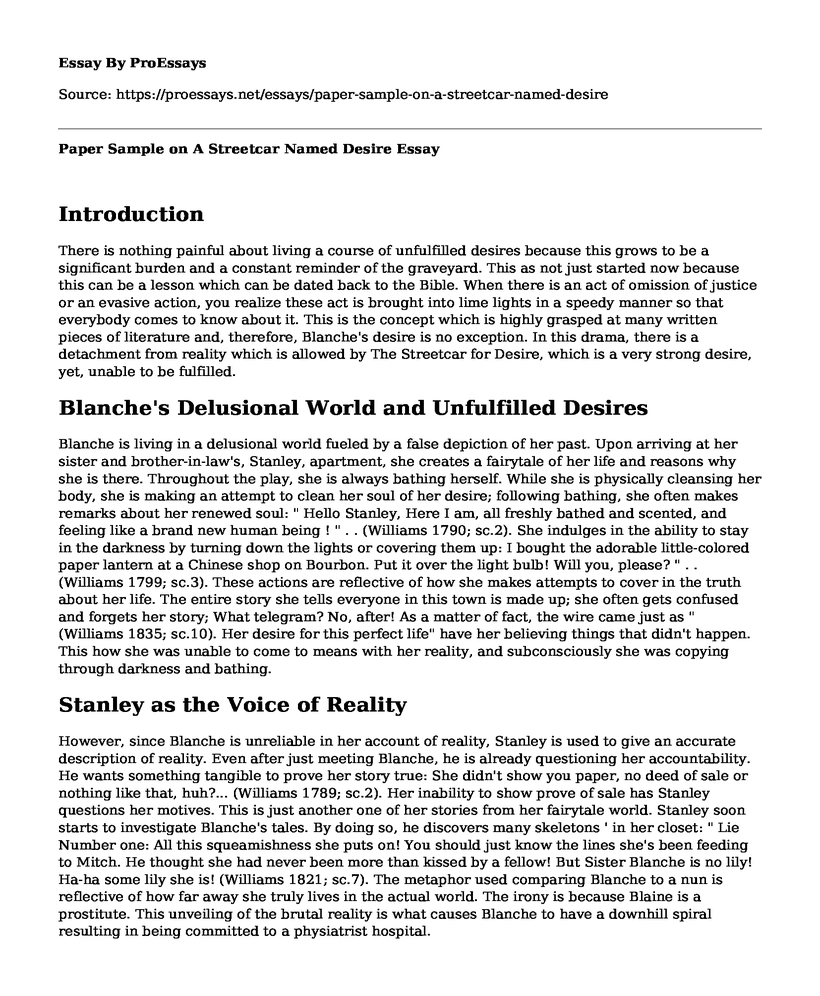Introduction
There is nothing painful about living a course of unfulfilled desires because this grows to be a significant burden and a constant reminder of the graveyard. This as not just started now because this can be a lesson which can be dated back to the Bible. When there is an act of omission of justice or an evasive action, you realize these act is brought into lime lights in a speedy manner so that everybody comes to know about it. This is the concept which is highly grasped at many written pieces of literature and, therefore, Blanche's desire is no exception. In this drama, there is a detachment from reality which is allowed by The Streetcar for Desire, which is a very strong desire, yet, unable to be fulfilled.
Blanche's Delusional World and Unfulfilled Desires
Blanche is living in a delusional world fueled by a false depiction of her past. Upon arriving at her sister and brother-in-law's, Stanley, apartment, she creates a fairytale of her life and reasons why she is there. Throughout the play, she is always bathing herself. While she is physically cleansing her body, she is making an attempt to clean her soul of her desire; following bathing, she often makes remarks about her renewed soul: " Hello Stanley, Here I am, all freshly bathed and scented, and feeling like a brand new human being ! " . . (Williams 1790; sc.2). She indulges in the ability to stay in the darkness by turning down the lights or covering them up: I bought the adorable little-colored paper lantern at a Chinese shop on Bourbon. Put it over the light bulb! Will you, please? " . . (Williams 1799; sc.3). These actions are reflective of how she makes attempts to cover in the truth about her life. The entire story she tells everyone in this town is made up; she often gets confused and forgets her story; What telegram? No, after! As a matter of fact, the wire came just as " (Williams 1835; sc.10). Her desire for this perfect life" have her believing things that didn't happen. This how she was unable to come to means with her reality, and subconsciously she was copying through darkness and bathing.
Stanley as the Voice of Reality
However, since Blanche is unreliable in her account of reality, Stanley is used to give an accurate description of reality. Even after just meeting Blanche, he is already questioning her accountability. He wants something tangible to prove her story true: She didn't show you paper, no deed of sale or nothing like that, huh?... (Williams 1789; sc.2). Her inability to show prove of sale has Stanley questions her motives. This is just another one of her stories from her fairytale world. Stanley soon starts to investigate Blanche's tales. By doing so, he discovers many skeletons ' in her closet: " Lie Number one: All this squeamishness she puts on! You should just know the lines she's been feeding to Mitch. He thought she had never been more than kissed by a fellow! But Sister Blanche is no lily! Ha-ha some lily she is! (Williams 1821; sc.7). The metaphor used comparing Blanche to a nun is reflective of how far away she truly lives in the actual world. The irony is because Blaine is a prostitute. This unveiling of the brutal reality is what causes Blanche to have a downhill spiral resulting in being committed to a physiatrist hospital.
The Symbolism of the Title: A Streetcar Named Desire
The title of this poem is symbolic of how Blanche has gotten herself in this situation. Speaking, the streetcar named desire did take her to sister's house. However, her desire for this "perfected life resulting in lies and deception has driven her out of her hometown. Her sister asks her if she has had ride on the streetcar of desire and she answers It brought me here. - Where I'm not wanted and where I'm ashamed to be." (Williams 1806; sc.4). It is never fully explained whether it is her mountain of lies that caused her to leave or her sexual impurities which she uses as a coping mechanism. In Survey's analysis of William's writing, he notes his use of certain words: As a playwright, Tennessee Williams was acutely aware of both the power and the limitations of the word." (Flockemann, Miki 218-226).The is evident in his choice of title for this drama. A streetcar is reflective of Blanche's running away from her trouble while desire is the cause of this action. The title is captivating of the overall theme.
While Blanche's unrealistic desire for life has her unable to come to terms with reality, she must pay the ultimate price for living in a hospital. Most people have exaggerated the truth in order to make themselves to look better, however she takes it entirely too far. The truth has more power than initially given. This is something that would have saved Blanche's life.
Work Cited
Williams, Tennessee. A Streetcar Named Desire: [a Play. New York: New Directions, 1947. Print.
Flockemann, Miki, Jerome Cornelius, and Jolyn Phillips. "Grahamstown 2012 : Theatres of Belonging, Longing and Counting the Bullets." Satj : South African Theatre Journal. 26.2 (2012): 218-226. Print.
Cite this page
Paper Sample on A Streetcar Named Desire. (2021, Mar 12). Retrieved from https://proessays.net/essays/paper-sample-on-a-streetcar-named-desire
If you are the original author of this essay and no longer wish to have it published on the ProEssays website, please click below to request its removal:
- Critical Essay Sample on 1984 by George Orwell
- On the Death of Dr. Robert Levet Elegy Essay
- Essay Sample on The Mozart Effect
- The Yellow Cow by Franz Marc - Painting Analysis Essay
- Critical Essay on Adam Curtis' Documentary: HyperNormalisation
- The Story of an Hour by Kate Chopin Essay Example
- Movies: Cultural Manifestation and Business Success - Essay Sample







